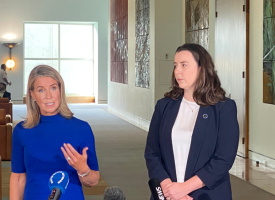GP Network News, Issue 13 Number 33
In this issue: Campaign capers;Coalition has been listening on health policy;Labor health package would build hospital capacity and expands important health services;New rules should boost vaccination rates;GPMPs, TCAs and reviews help to improve diabetes outcomes;What's in the latest Medical Journal of Australia?;Middle East respiratory syndrome (MERS) coronavirus - situation update;Email the AMA;Post new comment to the website;
It has taken three weeks, but we have finally witnessed the first big bids in the health policy auction of the 2013 election campaign. The major parties this week both played their big cards - and they were targeted at opposite ends of the health system spectrum. Labor came out firing first and, in keeping with Kevin Rudd's style in his first stint as PM, the focus was very much on public hospitals. The Labor package for the week comprised a $357 million package for hospital and medical treatment facilities, with Sydney's Westmead Hospital topping the charts with $100 million towards its major redevelopment (the hospital needs at least $800 million); a $250 million Medical Research Innovation Fund ($125 million Government money); a Family Payment incentive to boost vaccination rates; $50 million for Medicare Locals to provide stroke care; a $15 million cancer care package for rural Australia; and changes to pharmaceutical pricing policy that will ultimately save $125 million on the price of medicines. While the package appears big and bold, a lot of the funding and announcements have been released before or funding already existed in the Budget. Nevertheless, it is a bold pitch. But the missing link is primary care - more specifically general practice. And that is where the Coalition policy presents a stark contrast. The priority is primary care and general practice. Hospitals hardly rate a mention. By Tony Abbott's own admission it is modest on spending, but it is all about better targeting of health spending. The Opposition Leader said the Coalition would maintain the current system of health funding but the theme would be 'maximising health services, minimising health bureaucracy'. The Coalition policy responds directly to AMA lobbying in key areas. The AMA has welcomed funding for GP infrastructure grants, 100 new intern places a year, a doubling of the practice incentive payment for teaching in general practice, and a welcome review of Medicare Locals. There is also funding for bowel cancer screening and a diabetes strategy. The Coalition policy ticked quite a few boxes in the AMA's Key Health Issues document. Meanwhile, the AMA has welcomed policy from The Greens to ban alcohol advertising in children's television viewing times, restore MBS indexation, and the earlier pledge to establish an independent health panel to monitor asylum seeker health. Given the enormous expectation in the electorate about health policy, we expect more health policy from all sides in the final two weeks of the campaign. It would be wise for the major parties to fill the obvious gaps in their policies. Here is a summary of the Labor announcements:
The Coalition promises that its Policy to Support Australia's Health System will:
John Flannery Coalition has been listening on health policy AMA President, Dr Steve Hambleton, said this week that the Coalition has delivered a strong package of practical, affordable health policies that would strengthen general practice, the cornerstone of quality primary health care in Australia. Dr Hambleton said the Coalition has listened to the medical profession and responded with targeted funding that will build on successful existing general practices in local communities and help ensure a steady flow of medical graduates into general practice into the future. "The AMA called for more GP infrastructure grants for general practice and the Coalition has promised 175 grants at a total cost of $52.5 million. "The AMA called for a doubling of the Practice Incentive Payment (PIP) from $100 to $200 to help local GPs teach medical students and encourage them to pursue a career in general practice, and the Coalition has delivered. "The AMA has been lobbying long and hard for more intern places to meet growing demand from the increasing numbers of medical graduates, and the Coalition has promised 100 new intern places a year, which is a better package than the 60 places promised by Labor. "We also support the review of Medicare Locals to ensure funding gets to frontline care. Dr Hambleton said the AMA also welcomes Coalition commitments on bowel cancer screening and diabetes research, but urges the Coalition to at least match Labor's funding promises for public hospitals. AMA Key Health Issues for the 2013 Federal Election is available on the AMA website. Labor health package would build hospital capacity and expands important health services AMA President, Dr Hambleton this week welcomed the Labor promise to provide $346 million of new funding for Australia's health and hospital system. He said that the public hospital system is overstretched and under constant pressure and this funding would allow hospitals to build capacity to meet growing patient demand. Dr Hambleton added that the AMA also welcomes the commitment to provide new funding for cancer care services around the country, and would now like to see a complementary commitment to primary care infrastructure. "It is important that we reduce the pressure on our hospitals by keeping people well and out of hospital - and the key to that is providing more support to general practice." The AMA wants the next Government to increase funding to GP infrastructure grants by an additional 600 grants at the level of the existing grants, a total cost of $180 million. New rules should boost vaccination rates AMA President, Dr Steve Hambleton, said this week Australia's vaccination rates should increase under new rules proposed by the Government. Under the new rules, only parents who fully immunise their children would have access to the Family Tax Benefit Part A. The only exemptions would be on medical or religious grounds. "It is appropriate to provide incentives to parents who respond to the calls for full immunisation," Dr Hambleton said. "We need to provide more information and education for parents whose children are not vaccinated or only partly vaccinated. It is important, too, that governments and health authorities continue their efforts to control groups that circulate lies and misinformation about the benefits to the community of vaccination. "The science is in - vaccination saves lives. The AMA strongly supports policies that will increase Australia's vaccination rates," Dr Hambleton said. GPMPs, TCAs and reviews help to improve diabetes outcomes A study examining the impact of Medicare items introduced to increase support for the management of chronic illness shows some significant improvements in outcomes for patients with diabetes. The study, published in the Medical Journal of Australia this week, found improvements in process and clinical outcomes for patients for whom GP Management Plans (GPMPs) or GPMPs and Team Care Arrangements (TCAs) were created, particularly when these were followed up by GPMP or TCA reviews. Lead author Leelani Wickramasinghe and colleagues found that there were significant improvements after creation of a GPMP in the proportion of Annual Cycle of Care (ACOC) clinical tests completed, total cholesterol level, LDL cholesterol level, and BMI. Patients using GPMPs and TCAs also improved their HbA1c level. The study also highlighted the possible importance of the web-based management tool cdmNet in improving adherence to best-practice guidelines for chronic disease management. Patients using cdmNet were four times more likely to have their GPMP or TCA followed up through regular reviews than the national average. Read this research article. What's in the latest Medical Journal of Australia? In addition to the study on the impact of care plans on diabetes management, this week's edition of MJA features several interesting articles related to diabetes, including a call for strategy and action to prevent the looming diabetes apocalypse; the history of insulin; and a discussion of the emerging use of glucagon-like peptide-1 receptor agonists combined with basal insulin as an option for treating patients with type 2 diabetes mellitus. Also discussed in this issue are the outcome at two years of the first hand transplant procedure in Australia; a warning of severe symptomatic hypocalcaemia following a single dose of denosumab; the trials and tribulations in the removal of Di-Gesic and Doloxene from the Australian Register of Therapeutic Goods; and three articles in the Pre-election series on the need to prioritise comprehensive primary health care and social determinants; the need for better information to drive health investment decisions; and a look at the journey of health reform in Australia. Read these articles and many more in MJA online. Middle East respiratory syndrome (MERS) coronavirus - situation update The Department of Health and Ageing issues a weekly situation update on the MERS coronavirus based on information from the WHO and other published sources. The latest update, current as of 22 August 2013, is available here. As of 10 August 2013, the WHO had received reports of 94 laboratory-confirmed cases of MERS-CoV, including 47 deaths. All cases have had a history of residence in or travel to the Middle East, or contact with travellers returning from these areas. There have been no cases in Australia. Evidence has been found for a potential animal host. Suitable PCR-based tests are available to diagnose the infection if required. However, serological tests for MERS-CoV are not currently available in Australia. GPs should be aware that many Muslims will be travelling to Saudi Arabia in August and October to undertake the Umrah and Hajj. The Department of Foreign Affairs and Trade (DFAT) has updated the Smartraveller advice for Saudi Arabia, Qatar, the United Arab Emirates and Jordan to include information about the outbreak. DFAT has also issued a bulletin for Pilgrims travelling to the Hajj this year, including information about the risk of MERS coronavirus. The advice is available from DFAT's website. We welcome your comments and suggestions as well. Please tell us what you think. |
|



